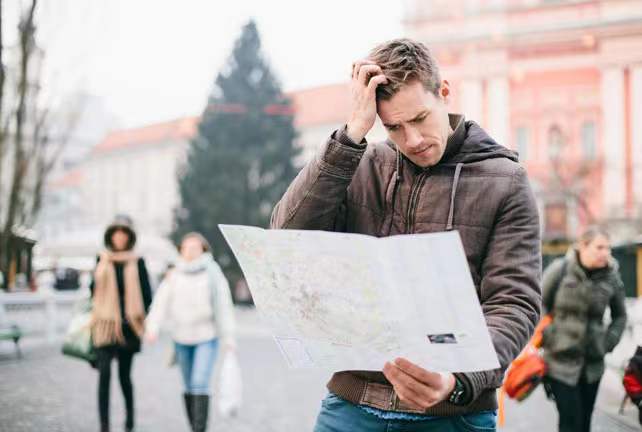
So first of all, the verb to say "to be lost" in Chinese is said: 迷路(mí lù)
With 迷(mí) which means "to be confused" and 路(lù) which means the road,and which comes from the word马路(mǎ lù)
You see it is funny this word because if we break it down, we see that it is composed of the character 马(mǎ) which means horse and the character 路(lù) which means road.So, in fact it's a reference to Chinese roads in the old days that were mostly used for horses, given that cars didn't exist yet.Well then let's imagine that you are lost in China, one of the simplest options you have is simply to ask your way to a passerbyAsk for directions in ChineseBut hey you can't directly approach someone like that, you see it wouldn't be polite. So a polite formula that you can already note is: 抱歉,打扰一下(bào qiàn,dǎ rǎo yī xià)with抱歉 (bào qiàn) which means "excuse me, and打扰一下 ( dǎ rǎo yī xià) to disturb you for a few moments.You see the word 打扰(dǎ rǎo) it's a super useful word that is used in many situations.So for example here instead of saying "抱歉(bào qiàn)" I could have said请问,打扰一下( qǐng wèn,dǎ rǎo yī xià)To translate this idea "Excuse me for bothering you for a moment, can you tell me if... »So note this sentence in Mandarin, it is super useful and not only to ask for directions in Chinese, you can take it out whenever you want to ask for information in a polite and formal way, whether at your hotel, at the reception of an establishment or any public place for example.Locate a place in ChineseThen, if you want to ask where a place in Mandarin is, you can also say: [xx] 在哪儿 ( zài nǎ ér)It means "where is located [xx] and you replace the xxx with the place you are looking to locate.By the way, you will find in the description of this video a list with lots of VOCABULARY related to directions and places in Chinese.I strongly invite you to pick it up because you will find in particular the name in Chinese of all the common places in China such as metro station, park, hospital etc ... as well as verbs of directions and movement to be able to orient yourself in Chinese.This is my personal list that I used when I had just arrived in China to quickly be able to ask for my way in Chinese so pause the video and retrieve it, it's very important because we will need it for the future.It's okay, you got the list back? Well then now you see if for example you are looking to locate the metro station, you go in my list, you look for the word metro station and you replace in the sentence I just gave you the xxx by metro station so it gives: 地铁站在哪儿(dì tiě zhàn zài nǎ ér )With 地铁站 (dì tiě zhàn)which means subway station in Mandarin.You see the trick when you ask this question is not to be wrong in the pronunciation of the character 哪儿 (nǎ ér), this one.If you pronounce it in the third tone, it means "or" in the sense that something is. Be careful not to pronounce it 那(nà)which in this case means it: the bottom! »You see the pronunciation is the same but the tones are different so we quickly made a mistake.To remember it you can imagine a guy pointing with a look at him to tell you that it's the ba. Pointing the finger dryly like that is a way of referring to the 4th tone of the word 那儿(nà ér) . It will save you from confusing it with 哪儿(nǎ ér)Another thing to know is that depending on where you travel in China, you will be able to hear a variant that is 哪里(nǎ lǐ ) . That is to say, we replaced the 儿 which is a sound characteristic of northern China by a softer and easier to pronounce 里 (lǐ ).I find that is characteristic of southern China.
Well the 2 mean exactly the same thing, so take the one you like the most, personally I have a preference for 里 (lǐ )since I learned Taiwan Chinese, so the 儿(ér) it stings my ears a little.
Request direction in Chinese
So, it's cool to know where the metro station is but it doesn't tell you how to get there. So the most important question you absolutely need to know to ask for instructions is: 地铁站怎么走(dì tiě zhàn zěn me zǒu)
Who means "how to go to this place" with 怎么(zěn me)which means how and 走(zǒu) which is a verb that means “to walk to”So the verb 走(zǒu) it comes from the verb 走路(zǒu lù ) which means "to walk" in Chinese, so it is an object verb since literally in fact it means "to walk on the road"So literally 地铁站怎么走(dì tiě zhàn zěn me zǒu)means "how to get to the subway station".You see the difference between 怎么走(zěn me zǒu) and the question blabla 在哪儿(zài nǎ ér), is that with 怎么走(zěn me zǒu) you ask the person for instructions to get to that place, whereas with 在哪儿(zài nǎ ér)you just asked "where this place is" which is not exactly the same thing!Thanks to Mandarin go, you will never be lost! Scan the QR code for more insights with us:








